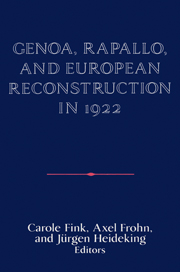Book contents
- Frontmatter
- Introduction
- 1 Beyond Revisionism: The Genoa Conference of 1922
- 2 The Genoa Conference of 1922: Lloyd George and the Politics of Recognition
- 3 A Rainy Day, April 16, 1922: The Rapallo Treaty and the Cloudy Perspective for German Foreign Policy
- 4 Reparations in 1922
- 5 Germany and the United States: The Concept of World Economic Interdependence
- 6 American Policy Toward Debts and Reconstruction at Genoa, 1922
- 7 French Plans for the Reconstruction of Russia: A History and Evaluation
- 8 The Oil Problem and Soviet-American Relations at the Genoa Conference of 1922
- 9 Italy at the Genoa Conference: Italian-Soviet Commercial Relations
- 10 The European Policy of Czechoslovakia on the Eve of the Genoa Conference of 1922
- 11 The Genoa Conference and the Little Entente
- 12 The Role of Switzerland and the Neutral States at the Genoa Conference
- 13 The Genoa Conference and Japan: A Lesson in Great-Power Diplomacy
- Maps
- Appendix
- Bibliography
- Contributors
- Index
8 - The Oil Problem and Soviet-American Relations at the Genoa Conference of 1922
Published online by Cambridge University Press: 05 January 2013
- Frontmatter
- Introduction
- 1 Beyond Revisionism: The Genoa Conference of 1922
- 2 The Genoa Conference of 1922: Lloyd George and the Politics of Recognition
- 3 A Rainy Day, April 16, 1922: The Rapallo Treaty and the Cloudy Perspective for German Foreign Policy
- 4 Reparations in 1922
- 5 Germany and the United States: The Concept of World Economic Interdependence
- 6 American Policy Toward Debts and Reconstruction at Genoa, 1922
- 7 French Plans for the Reconstruction of Russia: A History and Evaluation
- 8 The Oil Problem and Soviet-American Relations at the Genoa Conference of 1922
- 9 Italy at the Genoa Conference: Italian-Soviet Commercial Relations
- 10 The European Policy of Czechoslovakia on the Eve of the Genoa Conference of 1922
- 11 The Genoa Conference and the Little Entente
- 12 The Role of Switzerland and the Neutral States at the Genoa Conference
- 13 The Genoa Conference and Japan: A Lesson in Great-Power Diplomacy
- Maps
- Appendix
- Bibliography
- Contributors
- Index
Summary
Although the oil problem was not on the agenda at the Genoa Conference, it in fact had an impact on the course of the negotiations. The United States did not participate formally in the conference, but the American ambassador to Italy, Richard W. Child, was in Genoa as an observer. Behind the scenes, the ambassador and the representatives of the American oil industry were quite active, and their role in the conference was very important.
Why speak about this in connection with the problem of European reconstruction? At least two reasons can be offered. First, the United States had acquired a new role in Europe as a result of World War I, and U.S. relations with Soviet Russia seriously influenced European diplomacy. Second, the oil problem had become an important issue in international relations. This could be seen in the sharp rivalry between the United States and the European powers over the oil fields of the Middle East: England and France had tried to establish their dominance by creating spheres of influence, while the United States insisted on the open-door policy.
Policy concerning the Russian oil fields was more or less similar in all the Western nations. After the October Revolution of 1917, the Russian oil industry had been nationalized, but no Western country wanted to accept this. During the Genoa Conference, the British businessman Leslie Urquart wrote in the Financial Times that in case the negotiations were successful and if foreign investments in Soviet Russia were accepted, Western corporations would receive “tempting” advantages.
- Type
- Chapter
- Information
- Genoa, Rapallo, and European Reconstruction in 1922 , pp. 149 - 158Publisher: Cambridge University PressPrint publication year: 1991

